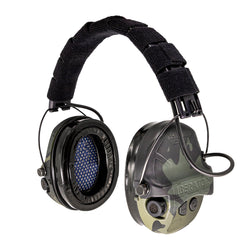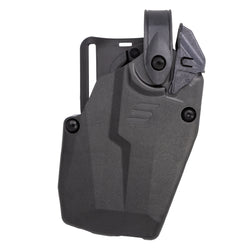Red dots on handguns are here to stay. Almost as quickly as the industry accepted that, the push for enclosed emitter optics began. Experience breeds innovation. Enclosed emitter optics offer a higher degree of reliability than open emitter designs. The Aimpoint ACRO pioneered the idea of a handgun red dot, and companies like Trijicon, Holosun, and Steiner followed suit with the Steiner MPS.

They are a subset of Beretta and produce nice optics that aren’t often marketed heavily. I can say the same for the budget-friendly Burris, also owned by Beretta. The Steiner MPS is one of the few that didn’t fall through the cracks. It followed right behind the Aimpoint and offered, at the time, an easier-to-find and slightly cheaper enclosed optic from a reputable company.
The Steiner MPS series wisely uses the ACRO footprint, which opens up the market for red dot mounts, pistol plates, and more. I’m admittedly a bit of a contrarian, so the Steiner appeals to me because it’s not a Trijicon, a Holosun, or Aimpoint. It’s a little different, but does different mean good? Let’s dig into it and find out.
Steiner MPS – Design and Features
The MPS looks like a mailbox, as if I should be sending letters to the North Pole. It looks bulky, but its overall size is not all that different from that of an enclosed emitter design.
Specifications
- Weight: 2.05 oz
- Dot Size: 3.3 MOA
- Lens: 20×16 mm
- Brightness Settings: 8 (6 daylight, 2 NV)
- Auto Shutoff: 13 hours (older models)
- Footprint: ACRO Compatible
The optic weighs 2.05 ounces, so it’s no boat anchor. The objective lens is 20×16 mm and feels nice and open to me. When I first started with enclosed emitters, I felt the view was too small, but after plenty of practice, I realized it didn’t make much of a difference.

The Steiner MPS uses a precise, circular 3.3 MOA red dot. The MPS system has eight brightness settings with six daylight and two nightvision modes. There are two variants of the MPS. Older models like mine have an auto shut-off mode. After 13 hours, the optic turns itself off. Newer models do not have an auto-shutoff feature.
I think Steiner’s biggest mistake was not implementing a shake-awake style design. Specifically, an aggressive one. The lack of shake-awake means the user needs to be conscious of turning the optic on or off when in use. The auto-shutoff after 13 hours isn’t likely to be a problem, until it is.

Steiner uses an interesting emitter design. Most optics put the emitter at the bottom, but the Steiner puts it at the top. This allows the battery compartment to be at the top of the optic, meaning it can sit lower on the gun, allowing for a better view of suppressor height iron sights.
Range Performance
As a natural contrarian, I mounted this to Arex Delta X, which is a striker-fired alternative to guns like the Glock and FN 509 series. The two are a perfect fit.
With the optic mounted, I zeroed the gun at 10 yards and confirmed at 25 yards. The turrets have 1 MOA adjustments and deliver solid audible and tactile clicks. Zeroing took no time at all.

The dot on the Steiner MPS is quite crisp and clear. It’s round and looks fantastic. The six daylight settings are more than enough for daytime use in the Sunshine State. The dot has an excellent refresh rate and is easy to track. It doesn’t lag or stutter as the slide moves, and driving the gun from target to target doesn’t reveal any real faults.
The view through the optic is super clear. There is a notch filter with a very slight blue tint, but it’s only noticeable in low light when aiming into bright areas. Overall, it’s remarkably clear, delivering that typical Steiner clarity.

I went through the typical shooting drills. I practiced drawing from concealment, shooting Bill Drills, 10-10-10 drills, and simple transitions. It allowed me to observe the dot’s impressive performance. The 3.3 MOA dot strikes an excellent balance between being easy to see and small enough to be precise.
Even at 50 yards, the dot remains small enough to see a 10-inch gong, and if you can see it, you can hit it. Tracking the dot isn’t tough, and you can keep the streak moving without feeling challenged.
Usability and Everyday Carry
The Steiner MPS has a nice set of external features. The buttons are on the left side of the optic, with simple + and – functionality. They are recessed fairly deeply, which requires a dedicated press to change brightness. This sounds like a hassle, but if you carry it with a red dot, it’s a handy feature. This design keeps the buttons from being accidentally pressed when carried concealed.

The MPS has thin walls, making it easy to see around without blocking larger parts of your vision. Up top, the round battery cover can be secured low and tight with a front head tool. It hardly sticks above the top of the rest of the optic. It seems like there was an effort to minimize the size, but it won’t get past the mailbox jokes anytime soon.
Pros
- Crisp 3.3 MOA red dot
- ACRO footprint compatibility
- Clear optics with minimal distortion
- Lightweight and compact
- Buttons recessed to prevent accidental presses
Cons
- No shake-awake feature
- 13-hour auto-off may be insufficient at high brightness
Final Verdict
Let’s slam the gavel down! Overall, the Steiner MPS is a high performer. It’s clear, has a great reticle, is easy to zero, and is thoughtfully designed to minimize bulk. The buttons are great, the emitter design is interesting, and using the ACRO footprint was a solid idea.
However, the lack of a shake-awake feature is a drawback. The battery life is 13,000 hours, which is not that long for a pistol optic. It seems like a lot, but that’s 13K hours at the medium setting. I carry at a higher setting, which will deplete the battery faster than 13,000 hours.

The MPS is a nice optic, but it does have some flaws, especially compared to the Aimpoint ACRO or even the Holosun EPS. I still like it, and if this optic were priced at $300, then it’d be a smash hit. But at around $500, in my opinion, there are better options out there.









